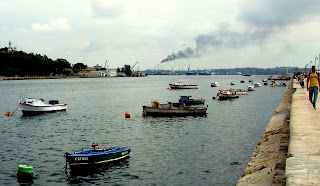Raul Castro’s speech to the communist youth convention last Sunday doesn’t require a lot of reading between the lines. (Spanish text here, English here.)
The hunger strike of Guillermo Farinas amounts to “blackmail,” he says, and Cuba will not yield to it. He alleges that the same parties who encouraged Zapata to enter his hunger strike are doing the same with Farinas, and they are the “only beneficiaries.” He questions the standing of the United States and Europe to be questioning Cuba over human rights, and says this is all occurring amid “ferocious and coordinated media campaigns.” To put things in perspective, he looks back at the fight against Batista, the Bay of Pigs, and the missile crisis, and reassures his audience that it would be hard for the current situation to top any of those crises.
In other words: things are a little hot right now on the political front, but we’ll get through it.
The economic discussion was framed a bit differently. Economic policy – the “economic battle,” as he calls it – is the main task, the central focus of ideological work, and the determining factor in the “sustainability and preservation of our social system.”
In other words, it’s for all the marbles.
“Excessively paternalistic and irrational regulations” have to go, in part to solve emerging labor shortages in several key lines of work. People have to reject illegality and corruption. Inflated payrolls have to go; there may be one million excess workers. Pay has to be linked to results. Dogmas have to be broken and the “updating of our economic model, already in progress,” has to proceed.
Some might dispute the “already in progress” part, especially if they have nothing to do with agriculture – and Raul recognized that many are “exasperated,” preferring to see “immediate changes in numerous areas.” His response is that the government is avoiding “hurried or improvised” actions, and hence avoiding a situation where reforms would solve some problems but give rise to new ones.
What would the danger be, and what new problems could result from haste in economic reform? Raul didn’t specify. One can imagine that they could be social, or political, or budgetary, or all three.
Regardless, apart from the you-are-the-future messages directed at his immediate audience, the speech told the world that if Farinas dies it will be Farinas’ fault, and it told Cubans that the slow pace of economic reform (imperceptibly slow, to many) is the right pace, and will not change.

















